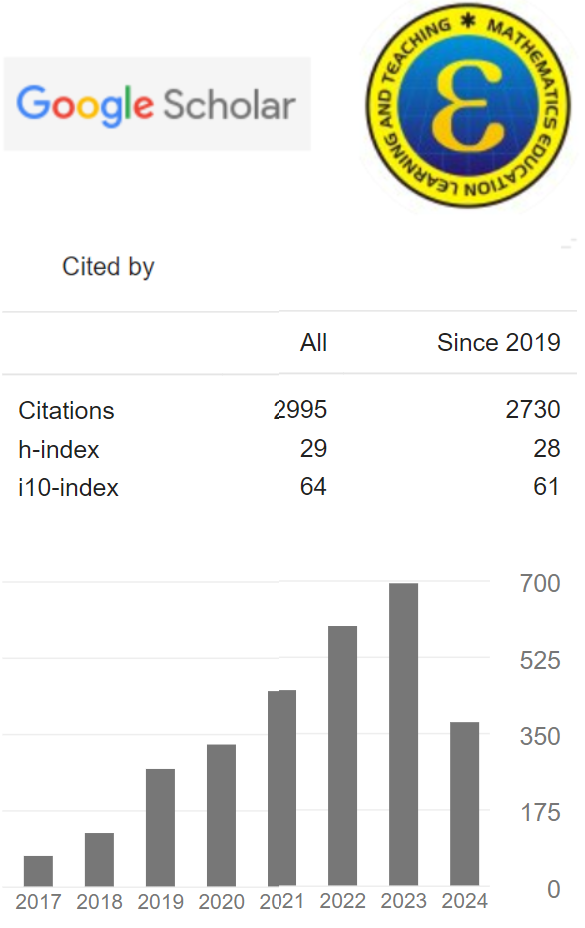Analysis of Students' Relational Understanding Ability Through the Application of Blended Learning Method
(1) Universitas Singaperbangsa Karawang
(2) Universitas Singaperbangsa Karawang
(*) Corresponding Author
Abstract
The students' relational understanding by applying blended learning is described in this study. The research method is descriptive quantitative that was performed by pre-experimental with a one-shot case study design. This study involves 33 class VIII students in one of the Karawang State Junior High Schools, which was selected by purposive sampling. There are five questions on the post-test that use as instrument tests. The quantitative data analysis is based on the statistical descriptive and statistical tests. The results show that students who have a high category are six students (18%), the medium category is 25 students (76%), and the low category is two students (6%). The average of all students in the sample class is 61.36, still below the KKM=76. The median test obtained 0,149 ≥ 0,025, such that it is rejected or accepted. It suggests that at the 95% confidence interval, the median student's relational understanding ability after applying the blended learning method could not reach the KKM.
Keywords
Full Text:
PDFReferences
Abroto, Maemonah, & Ayu, N. P. (2021). Pengaruh Metode Blended Learning dalam Meningkatkan Motivasi dan Hasil Belajar Siswa Sekolah Dasar. Edukatif: Jurnal Ilmu Pendidikan, 3(5), 1993–2000. https://www.edukatif.org/index.php/edukatif/article/view/703
Arifin, M., & Abduh, M. (2021). Peningkatan Motivasi Belajar Model Pembelajaran Blended Learning. Jurnal Basicedu, 5(4), 2339–2347. https://doi.org/https://doi.org/10.31004/basicedu.v5i4.1201
Aslamiyah, T. Al, Setyosari, P., & Praherdhiono, H. (2019). Blended Learning dan Kemandirian Belajar Mahasiswa Teknologi Pendidikan. JKTP : Jurnal Kajian Teknologi Pendidikan, 2(2), 109–114. https://doi.org/http://dx.doi.org/10.17977/um038v2i22019p109
Hariyanti, S., Arjudin, & Baidowi. (2021). Efektivitas Media Pembelajaran Terhadap Prestasi Belajar Matematika Siswa Kelas XI SMA Negeri 10 Mataram. Mandalika Mathematics and Educations Journal, 3(1), 19–29. https://doi.org/http://dx.doi.org/10.29303/jm.v3i1.2275
Hendrik, B., Masril, M., & Firdaus. (2021). Meningkatkan Kemandirian Belajar Mahasiswa melalui Penerapan Blended Learning pada Mata Kuliah Algoritma dan Pemrograman I. Edukatif : Jurnal Ilmu Pendidikan, 3(4), 2192–2198. https://doi.org/https://doi.org/10.31004/edukatif.v3i4.1156
Idris, H. (2018). Pembelajaran Model Blended Learning. Jurnal Ilmiah Iqra’, 5(1), 61–73. https://doi.org/10.30984/jii.v5i1.562
Lestari, K.E & Yudhanegara, M.R. (2015). Penelitian Pendidikan Matematika. Bandung: PT. Refika Aditama.
Masyulah, S., Febrianti, N. R., Putri, A. K., & Bahtiar, M. D. (2021). Efektivitas Penerapan Blended Learning Pada Mata Kuliah Akuntasi Biaya. Prosiding Seminar Nasional Akuntansi, Keuangan, dan Ekonomi, 1(4), 39–47. http://conference.um.ac.id/index.php/nsafe/article/view/916/832
Rahmi, F., Iltavia, & Zarista, R. H. (2021). Efektivitas Pembelajaran Berorientasi Matematika Realistik untuk Membangun Pemahaman Relasional pada Materi Peluang. Jurnal Cendekia : Jurnal Pendidikan Matematika, 05(03), 2869–2877. https://doi.org/https://doi.org/10.31004/cendekia.v5i3.673
Ramadania, F., & Aswadi, D. (2020). Blended Learning dalam Merdeka Belajar Teks Eksposisi. STILISTIKA: Jurnal Bahasa, Sastra, dan Pengajarannya, 5(1), 10–21. https://doi.org/https://doi.org/10.33654/sti.v5i1.1014
Riinawati. (2021). Hubungan Penggunaan Model Pembelajaran Blended Learning terhadap Hasil Belajar Matematika Siswa Sekolah Dasar. Edukatif : Jurnal Ilmu Pendidikan, 3(6), 3794–3801. https://doi.org/https://doi.org/10.31004/edukatif.v3i6.1083
Usman. (2018). Komunikasi Pendidikan Berbasis Blended Learning dalam Membentuk Kemandirian Belajar. Jurnalisa : Jurnal Jurusan Jurnalistik, 4(1), 136–150. https://doi.org/https://doi.org/10.24252/jurnalisa.v4i1.5626
Wijayanti, E. (2019). Identifikasi Kesulitan Mahasiswa Pendidikan Fisika dalam Memahami Materi. Bahana Pendidikan : Jurnal Pendidkan Sains, 1(1), 7–15. https://e-journal.upr.ac.id/index.php/bpjps/article/view/bpjpsv1i1a2
DOI: 10.24235/eduma.v12i1.10118
Article Metrics
Abstract view : 50 timesPDF - 6 times
Refbacks
- There are currently no refbacks.
Copyright (c) 2024 EduMa: Mathematics education learning and teachingâ€â€â€Ž


.png)










